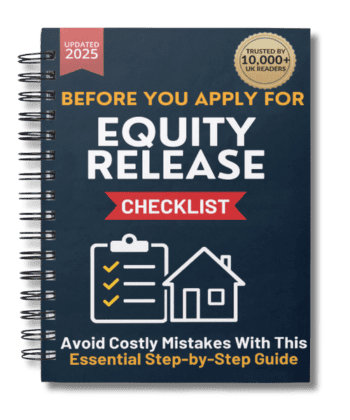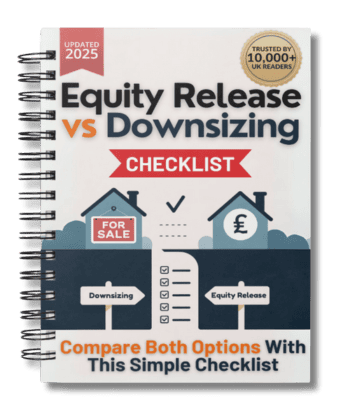
What Does MoneySavingExpert Think About Equity Release in 2025?
 Be aware. Equity release comes with drawbacks which are important to think about. Lifetime mortgages are secured loans. Compound interest means the amount you owe can grow quickly. Equity release reduces your estate's value and may impact means-tested benefits.
Be aware. Equity release comes with drawbacks which are important to think about. Lifetime mortgages are secured loans. Compound interest means the amount you owe can grow quickly. Equity release reduces your estate's value and may impact means-tested benefits.Key Takeaways
- MoneySavingExpert encourages homeowners to explore all financial options, including downsizing, remortgaging, or budget restructuring, before committing to an equity release product such as a lifetime mortgage or home reversion plan.
- Compound interest on lifetime mortgages can significantly reduce the value of an estate over time, affecting potential inheritance.
- MSE advises consulting an independent, FCA-regulated financial adviser and considering alternatives such as government grants, state benefits, or low-interest personal loans before unlocking property equity1.
Choosing the right equity release option can have long-term financial consequences, particularly for retirees managing limited income and estate planning.
This article reviews MoneySavingExpert’s guidance on equity release, highlighting how to identify regulated providers, avoid common pitfalls, and assess whether alternatives such as downsizing or government support may be more appropriate.
In This Article, You Will Discover:
With independent tools, comparison resources, and FCA-aligned advice, MoneySavingExpert has become a trusted source of impartial information for UK homeowners exploring later-life borrowing.
Therefore:
NOTE: EveryInvestor is an impartial and unconnected third-party information provider via this website, and the details replicated in this commentary represent the opinions of EveryInvestor only and may not reflect the views or opinions of MoneySavingExpert.com. This article must not be interpreted as advice, nor is it a solicitation to conduct transactions in any financial product provided by MoneySavingExpert.com.
Who Owns MoneySavingExpert and Is It Trustworthy?
MoneySavingExpert.com was founded in 2003 by Martin Lewis, a well-known UK financial journalist and consumer advocate. The site provides impartial guidance on a range of financial topics, including budgeting, credit cards, mortgages, and equity release.
In 2012, MoneySavingExpert was acquired by the MoneySupermarket Group for £87 million, securing its future while maintaining editorial independence2.
Today, it is one of the UK’s most visited consumer websites, attracting over 16 million monthly users seeking to reduce bills, find better financial deals, and improve their financial literacy3.
Why Trust Martin Lewis and MoneySavingExpert for Equity Release Information?
MoneySavingExpert’s content is researched and written by experienced financial journalists and verified by specialists. While the site does not sell equity release products directly, it provides tools and guidance to help users evaluate their options, understand the risks of compound interest, and avoid unregulated providers.
According to the site, users who follow its advice can save up to 25% of their income by adopting cost-cutting strategies and choosing better financial products4.
MoneySavingExpert has earned several industry accolades, including:
- Most Useful Website of the Year (2003)
- Bradford & Bingley Personal Finance New Media Award (2005)
- Hitwise Top Business Information Website (2010)
- Brand of the Year – Drum Online Media Awards (2018)5
These achievements, combined with its editorial independence and regulatory focus, make MoneySavingExpert a reliable source for understanding equity release and other complex financial products.
What Does MSE Say About Equity Release Plans?
MoneySavingExpert (MSE) provides impartial guidance on equity release, focusing on both its potential uses and significant long-term implications. While not opposed to equity release, MSE strongly encourages exploring alternatives first and fully understanding the compounding cost of borrowing against home equity.
What Is an Equity Release Scheme in the UK?
According to MSE, equity release allows homeowners aged 55 and over to access a portion of their property’s value without having to sell or move out. The most common forms are:
- Lifetime mortgages – a loan secured against your home that doesn’t require monthly repayments. Interest compounds over time and is typically repaid from the sale of your home when you die or enter long-term care.
- Home reversion plans – where you sell part (or all) of your home to a provider in exchange for a tax-free lump sum or regular payments, but continue to live there rent-free.
MSE warns that while these schemes can provide flexibility in retirement, they can also substantially reduce the value of your estate and affect eligibility for means-tested benefits like Pension Credit or Council Tax Reduction6.
Martin Lewis’s Key Advice on Equity Release
Martin Lewis recommends treating equity release as a last resort rather than a go-to financial product. His main points include:
- Explore alternatives first: These might include downsizing, remortgaging, cutting unnecessary spending, or checking eligibility for government grants or social care support.
- Understand compound interest: With lifetime mortgages, interest accrues on both the initial loan and previous interest, which can double the debt every 14–15 years depending on the rate.
- Check lender regulation: Always use a provider approved by the Equity Release Council to benefit from safeguards like the no negative equity guarantee, ensuring you will never owe more than your home’s value7.
- Seek independent financial advice: MSE strongly recommends using an FCA-regulated financial adviser with equity release qualifications before making any commitments8.
How to Qualify for Equity Release in the UK
Equity release isn’t available to everyone, and understanding the basic eligibility criteria is the first step toward determining if this later-life borrowing option suits your circumstances.
Eligibility Criteria for Equity Release
To qualify for equity release in the UK, MoneySavingExpert outlines the following key requirements:
- Minimum age: You must be at least 55 years old. Some providers may set higher age thresholds depending on the product.
- Property value: Your property should typically be worth at least £70,000, although this varies by lender.
- Location: The property must be in the UK and generally be your main residence.
- Property condition: Homes should be in reasonable condition and meet basic structural standards.
- Mortgage status: You must either own your home outright or have a small remaining mortgage balance that will be repaid with the equity release funds.
In addition to meeting technical criteria, inheritance planning is a key consideration. Equity release will reduce the value of your estate, and MSE encourages applicants to discuss this impact with their family and a qualified adviser9.
Application Process Through MoneySavingExpert
MoneySavingExpert does not offer equity release products directly, but it provides helpful comparison tools and educational guides to support the application process.
According to MSE, applying typically involves:
- Research – Understand how equity release works, the pros and cons, and available schemes.
- Use comparison tools – Evaluate different plans and providers using trusted comparison websites.
- Consult an FCA-regulated adviser – This step is mandatory for equity release and ensures suitability and compliance.
- Valuation and legal advice – Your property will be valued, and independent legal advice is required before contracts are signed.
- Receive funds – Once approved, funds are released either as a lump sum or via drawdown.
This multi-step process is designed to protect consumers and ensure they fully understand the implications of borrowing against their home.
Considering Alternatives: MSE’s Loan Advice
MoneySavingExpert often highlights that equity release should not be the default option for accessing funds.
Alternatives to consider include:
- Low-interest personal loans (if you meet affordability checks)
- Secured homeowner loans
- Remortgaging
- Government grants or local authority support, especially for home improvements or energy efficiency upgrades
- Downsizing, which releases capital without taking on debt
These alternatives often have lower long-term costs and fewer implications for inheritance. Comparing these options side by side is crucial to ensure equity release is the most appropriate financial path10.
Equity Release Interest Rates and Fees Explained
Equity release products, especially lifetime mortgages, come with long-term financial commitments that can significantly impact your estate value.
Understanding how interest compounds and what fees are involved is essential before proceeding.
Current Interest Rates for Lifetime Mortgages
According to MoneySavingExpert, interest rates for equity release, particularly lifetime mortgages, can vary significantly depending on the lender, product features (e.g. drawdown vs lump sum), and your age and property value.
As of June 2025, typical equity release interest rates in the UK range between 5.85% and 6.45% AER. These are fixed for life but accumulate through compound interest, meaning you pay interest on both the loan and previously accrued interest over time.
To illustrate this, MoneySavingExpert offers a free equity release calculator that shows how quickly a £50,000 loan can double in cost over 15–20 years depending on the rate applied11.
Common Fees Associated with Equity Release
While some equity release providers offer no upfront fees, many charge for the following:
- Valuation fees: Often waived, but may apply for high-value or unusual properties
- Legal fees: Usually £600–£1,500 for independent legal advice
- Advice fees: Some advisers charge up to £995, though others are commission-based
- Lender arrangement fees: These can range from £0 to £1,000, depending on the provider and plan
MSE recommends comparing total cost of borrowing, not just interest rate, to understand your long-term financial exposure12.
How MSE Helps You Compare Equity Release Providers
MoneySavingExpert provides users with free, impartial tools and editorial guidance to evaluate equity release providers safely and transparently.
Here’s how MSE helps you compare options:
- Provider Comparison Tools: MSE links to third-party FCA-authorised advisers and broker platforms where you can compare quotes across multiple equity release lenders. These comparisons usually show interest rates, plan types (e.g. lump sum or drawdown), and early repayment features.
- Lifetime Mortgage Calculator: Their calculator estimates how much you could borrow and how compound interest will affect your estate over time, helping you compare total costs between providers.
- Educational Criteria: MSE teaches you what to look for when comparing providers, including:
- Whether the lender is a member of the Equity Release Council
- The presence of a no-negative-equity guarantee
- The ability to make voluntary repayments or port the plan if you move
- Independent Guidance: Rather than steering users toward specific companies, MSE focuses on explaining how to evaluate provider reputations, terms, and fees, arming users with decision-making power.
While MSE itself doesn’t provide financial advice or sell plans, its platform connects users to verified information and FCA-regulated brokers, helping them compare offers confidently.
MoneySavingExpert does not provide equity release products or financial advice directly. Instead, it offers impartial tools, checklists, and calculators to help users compare FCA-regulated equity release providers.
Regulatory Oversight and Provider Safety
All brokers or providers listed or linked through MSE are expected to be authorised by the Financial Conduct Authority (FCA). MSE itself is operated by:
- MoneySavingExpert.com Limited
- FCA Registration Number: 587302
- Companies House Number: 03157344
- Registered Office: One Dean Street, London, W1D 3RB
You can verify their regulatory status via the FCA Register.
Contact Information
For questions about MSE’s content or comparison tools:
- Email: furtherhelp@moneysavingexpert.com
- Phone: +44 203 846 2796
- Website: www.moneysavingexpert.com
- One, Dean Street, London, W1D 3RB.
Is MoneySavingExpert’s Equity Release Advice Reliable?
MoneySavingExpert has earned a strong reputation for impartial, user-focused financial guidance, and its equity release content is no exception.
While it does not offer financial products, it provides accurate, well-researched information to help UK homeowners understand the risks and responsibilities associated with equity release.
Independent Editorial Approach
MoneySavingExpert’s equity release articles are written by qualified financial journalists and reviewed for accuracy. The site maintains a strict editorial independence policy, and its founder, Martin Lewis, does not profit from product promotion or affiliate links in this space.
This guide is an independent third-party review, unaffiliated with MSE, created to analyse the platform’s equity release insights and resources.
What Do Users Say About MSE?
MSE consistently receives positive feedback for its clarity, transparency, and consumer-first approach. While the site itself does not collect equity release-specific testimonials, it maintains strong general review scores on leading platforms:
- Trustpilot: 4.7 stars (over 20,000 reviews)
- Review Centre: Frequently praised for helping users make informed financial decisions
- Smart Money People: Users value the site’s impartiality and straightforward guidance
You can explore MSE’s reputation further by reading verified user reviews:
Real-World Case Studies
MSE occasionally features anonymised case studies to demonstrate how equity release may be used. These examples show real homeowners using lifetime mortgages to:
- Fund home improvements
- Clear unsecured debt
- Support family members
- Supplement retirement income without monthly repayments
One such case involved a retired couple who used equity release to renovate their home and contribute to their grandchildren’s education, while retaining full occupancy of their property under a no-negative-equity guarantee.
Community Discussion: The MSE Equity Release Forum
For those seeking peer feedback, the MoneySavingExpert Forum offers a dedicated space where users discuss their experiences with equity release providers, products, and brokers.
Key benefits of the forum include:
- Honest, real-world feedback from people who’ve used equity release
- Advice on provider transparency, fees, and regret-proofing your decision
- A place to ask questions and learn from others before speaking with a financial adviser

Common Questions
Martin Lewis recommends treating equity release as a last resort.
He advises homeowners to first explore alternative options such as downsizing, using savings, or applying for government support before borrowing against their home.
For those who do consider equity release, Lewis emphasises the importance of understanding how compound interest works and the potential impact on inheritance.
He also stresses the need to speak with an independent, FCA-regulated financial adviser before proceeding.
According to MoneySavingExpert, equity release offers a way to access the value tied up in your home without the need to move, often without monthly repayments.
However, the site also warns that compound interest can significantly erode your estate over time, and equity release may affect eligibility for means-tested benefits.
The guidance is clear that while equity release may be suitable for some, it should only be pursued after carefully weighing up the long-term financial implications and seeking professional advice.
Learn More: Pros and Cons of Equity Release
MoneySavingExpert is not a member of the Equity Release Council because it does not provide equity release products or financial services.
However, it strongly encourages users to choose equity release providers and advisers who are ERC members, as this offers additional consumer protections such as the no-negative-equity guarantee and the right to remain in your home for life.
MSE’s articles help readers identify trusted, regulated providers that meet these standards.
When comparing equity release providers, MoneySavingExpert advises focusing on whether the provider is authorised by the Financial Conduct Authority and a member of the Equity Release Council.
It is also important to assess the type of equity release plan on offer, the interest rate and how it compounds over time, repayment flexibility, and any associated fees.
MSE provides calculators and impartial tools to help users understand total borrowing costs and choose providers that offer long-term security and transparency.
No, MoneySavingExpert does not offer equity release products or allow applications through its website.
Instead, it provides impartial educational content, comparison tools, and links to FCA-regulated advisers and brokers who handle applications.
MSE’s role is to help you understand how equity release works, compare providers, and avoid unregulated or high-fee products.
Yes, releasing equity from your home can affect eligibility for means-tested benefits, such as Pension Credit or Council Tax Reduction.
Money received through equity release may be treated as capital or income, potentially reducing or eliminating your entitlement.
MoneySavingExpert recommends checking your benefit status with a financial adviser or using a benefits calculator before proceeding with an equity release plan.
The no-negative-equity guarantee ensures that you will never owe more than the value of your home when it is sold, even if the loan plus interest exceeds the sale price.
This protection is offered by all providers who are members of the Equity Release Council.
MoneySavingExpert strongly advises choosing a provider with this guarantee, as it protects your estate and your beneficiaries from future debt liabilities.
The amount you can borrow depends on your age, the value of your property, and the specific equity release product you choose.
Generally, the older you are and the higher your property value, the more you can release.
MoneySavingExpert offers an equity release calculator to help estimate your borrowing potential based on current market conditions and typical lending criteria.
In most equity release arrangements, particularly lifetime mortgages, the loan is repaid when your home is sold after your death or permanent move into long-term care.
The sale proceeds are used to repay the loan and any accumulated interest, with any remaining value passed on to your estate or beneficiaries.
If two people are named on the plan, the home is not sold until the second person passes away or enters care.
If you take out a lifetime mortgage, the most common type of equity release, you retain full ownership of your home.
You remain the legal owner and can continue living there until you die or move into care. In contrast, home reversion plans involve selling part or all of your home to a provider, which means you no longer own the full property.
MoneySavingExpert helps clarify these distinctions so homeowners can choose a plan that aligns with their preferences.
In Conclusion: MoneySavingExpert Equity Release
MoneySavingExpert is a trusted source of impartial information for homeowners considering equity release in the UK. While it does not sell financial products, the site helps users understand the benefits, risks, and long-term consequences of unlocking home equity later in life.
Martin Lewis consistently encourages homeowners to explore tax-efficient savings strategies, such as ISAs and pensions, before resorting to equity release. Where borrowing is necessary, MSE highlights the importance of seeking advice from an FCA-regulated equity release specialist.
Users can also access the MoneySavingExpert Forum, where real people share their equity release experiences, ask questions, and offer peer support on navigating this complex financial decision.
Before making any commitment, it’s essential to consult an independent financial adviser to determine whether equity release aligns with your long-term goals.
The features mentioned and the amounts raised, are subject to the lender’s criteria, terms and conditions. These may take into account the age, health and lifestyle factors in order to provide an enhanced amount. To understand the features and risks, ask for a personalised illustration.

Found an Error? Please report it here.





 100% private. No pressure. Just friendly guidance.
100% private. No pressure. Just friendly guidance.



